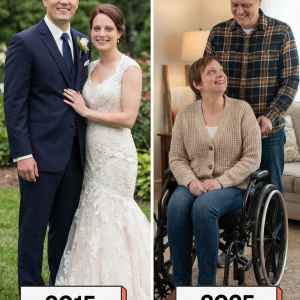It was just after 9:30 p.m. I had barely tucked my youngest into bed when the radio crackled to life. Dispatch reported a 911 call—no words, just silence. The trace led to a small home in my district. I didn’t know what I’d find, but I went anyway.
When I knocked, a little boy opened the door. Barefoot, wearing pajama shorts, holding a phone like it was something precious. He looked both scared and determined.
“I’m hungry,” he said quietly. “I haven’t eaten all day.”
My heart dropped.
No adults were home. Just him and his younger sister—five years old—sleeping in the next room. The house was tidy but almost empty. No food on the counters. The fridge held only a few ketchup packets and a nearly empty jug of milk.
I crouched down to his level and asked if I could take a picture with him—just for my memory, not for show. For the first time, he smiled.
Then I called for backup—not for an arrest or investigation, but for food. Because whatever was going on here, I wasn’t leaving until these kids had something to eat.
That night became one I’ll never forget.
While we waited, I talked with the boy. His name was Mateo, eight years old. His sister, Sofia, was five. Their mom worked two jobs—sometimes late into the night, sometimes overnight. She hadn’t come home from her morning shift at the diner, and the kids had run out of food hours ago.
Mateo spoke with a quiet maturity that no eight-year-old should have. He told me how he usually made sure Sofia ate dinner before bed, but that night even the peanut butter jar was empty.
Moments later, the distant wail of sirens broke the silence. Help had arrived. One of the responding paramedics, Rosa, had heard the call and decided to bring food. She walked in carrying a brown paper bag stuffed with sandwiches, juice boxes, and granola bars.
“You must be starving,” she said softly, handing Mateo a foil-wrapped sandwich. He hesitated, then gently set it aside. “I should wake Sofia first,” he murmured.
Rosa smiled. “Let her sleep. She’ll eat when she wakes up. You go ahead.”
Slowly, Mateo unwrapped the sandwich and took a bite. The relief on his face said everything. Watching him eat broke something inside me. It reminded me how easy it is to take a full fridge for granted.
Rosa and I exchanged a look. We both knew we couldn’t just leave.
“I’ll stay until social services arrives,” she offered. “You should try to find their mom.”
Her words made sense, but something about them didn’t sit right. Mateo’s eyes filled with worry when I mentioned bringing in more officials. He was scared of being taken away, not helped.
“Let me try calling her first,” I said gently.
Mateo nodded eagerly. “She works at Joe’s Diner,” he said. “But she can’t use her phone there.”
That gave us a lead. I radioed dispatch and asked someone to check the diner. Twenty minutes later, they confirmed she was there—distraught, crying, and frantic. She had left her phone at home and had no idea her children had been trying to reach her.
When she heard they were safe, she broke down in tears and begged to speak to them.
The moment Mateo heard her voice, his whole face lit up. He talked fast, excitedly telling her about the sandwiches and how kind Rosa had been. His relief was contagious—it filled the room.
By the time their mother made it home, social services had arrived. After hearing her story and seeing the home, they decided not to intervene further. She was given information about local support programs and meal resources instead.
As Rosa and I left that night, I couldn’t shake the image of Mateo holding that sandwich like it was the most valuable thing in the world. It stayed with me long after I went home.
Two weeks later, Rosa stopped by the station—this time out of uniform, wearing jeans and a bright yellow sweater, carrying a box of homemade cookies.
“I couldn’t stop thinking about those kids,” she said with a smile. “So I decided to do something about it.”
She told me she’d gathered a group of paramedics, nurses, and firefighters to start a volunteer initiative called Midnight Meals. Every Friday, they delivered care packages—snacks, toiletries, and handwritten notes—to families identified by local schools as needing extra help.
It didn’t take long for others to join. Teachers donated books, grocery store owners gave supplies, and even teens volunteered to pack boxes. What started as one act of kindness became a community-wide movement.
A few months later, on a cold December night, Rosa invited me along for a delivery. Our last stop was Mateo and Sofia’s house. I wasn’t sure what to expect.
To my surprise, Mateo ran out to greet us—this time wearing slippers, smiling wide. His mom stood beside him, grateful and proud. The house looked warmer now, decorated with paper snowflakes and a small Christmas tree from a local church. The kitchen table was filled with food and fruit from Midnight Meals donations.
Watching Mateo laugh while showing Rosa his school project, I realized something profound: small kindnesses can grow into something extraordinary. What began with a hungry child’s 911 call had become a chain reaction of compassion.
Before we left, Rosa handed Mateo a new backpack filled with school supplies. He hugged her tightly and whispered, “Thank you—for everything.”
Driving home that night, Rosa and I didn’t say much. We didn’t need to. We both knew why we did what we did. Some days this job breaks your heart—but nights like that remind you why it’s worth it.
Because sometimes, the smallest gesture—a sandwich, a phone call, a moment of care—can change someone’s world forever.





